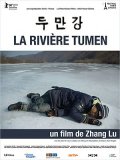
Dooman River
Rating: 7/10
Year: 2011
Genre: Drama
Director: Zhang Lu
Cast: Cui Jian, Yin Lian
Comprised of a roughly 2 million population, Korean is one of the smallest and most neglected ethnic minorities in China. As few of mainland filmmakers who show genuine interest and compassion toward this minority group, Korean Chinese director Zhang Lu has been making films that constantly remind people of the plague and struggle of his people. Starting from Grain in Ear, his films always revolve around the difficult life of Korean in the northern border of China. In 2011, his latest work Dooman River continues this direction and again depicts a subtle yet emotional story of Koreans near the borders of China and North Korea.
The protagonist of Dooman River is Chang-ho, a Korean Chinese boy who lives with his grandfather and mute sister near the country border at Dooman River. Known as a favorite spot for smuggling illegal immigrants, Chang-ho comes across a North Korean boy who comes scavenging food for his dying sister. The two befriends and becomes good soccer teammates. Later another North Korean illegal immigrant flees to Chang-ho's house. While Chang-ho's grandfather is generous enough to offer him shelter, the man fails to return the kind favor but instead spots Chang-ho's sister...
With a lucrative market that is growing rapidly, Chinese cinema is no doubt heading toward a purely commercial direction. Anything that is not celebrities attached or lacks entertainment value is deemed non-profitable and is almost impossible to be backed by major film studios or distributors. Therefore, while there are more and more blockbusters coming out, with the mere intention to make money and entertain mass group, fewer and fewer films attempt to utilize the film medium to address real social problems. Filmmakers like Zhang Lu who insist on exploring cultural barrier and daily life struggle of ethnic groups are even rare.
In Grain in Ear, Zhang focuses his story on a Chinese woman of Korean ancestry. And then in his following work Desert Dream, the attention goes to Korean refugees in China. This time in Dooman River, the point of interest again shifts back to the Chinese side. Told from the perspective of a Korean Chinese family, the film examines the interaction of Chinese villagers and Korean refugees, both of Korean ancestry, and how the contemporary social and political environment fosters this seemingly close yet obscure relationship between them.
Similar to Grain in Ear, the story of Dooman River is actually quite melodramatic and tear jerking, but what makes it different is Zhang Lu's unique narrative approach. Employing his signature tranquil and static camera work, Zhang's technique borrows the traditional Chinese art theory of "liu bai" (literally means leaving empty space for viewers to ponder over the subject), which results in a series of beautifully crafted composition. Most of the shots in the film runs for a duration that is long enough for viewers to not just see what happens, but also feels and touches the diegesis intimately. Zhang's poetic framing and patient editing successfully turns a rather thin tearjerker into a deeply emotional encounter of mundane life, hence transcends it to a highly spiritual and contemplative experience rather than a cheap and consuming movie-going behavior.
Apparently, Zhang Lu's film isn't for everyone. The slow pacing is especially a turnoff to most whose viewing habits are nurtured by typical Hollywood storytelling device. However, for those who see films as more than just entertainment, it is something that may generate some interest and provide insight on meaningful topics that are much more rewarding than just an hour of laughter or thrilling moment.
Dooman River is screened at 2011's San Francisco International Asian American Film Festival.
Reviewed by: Kantorates